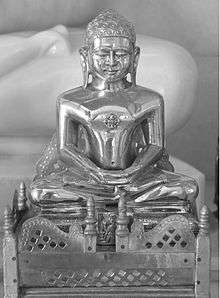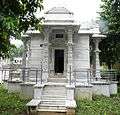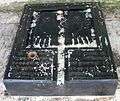Abhinandananatha
| Abhinandananatha | |
|---|---|
| 4th Jain Tirthankara | |
 Abhinandananath Jina | |
| Other names | Abhinandan Swami |
| Symbol | Monkey |
| Height | 350 dhanusha (1,050 meters) |
| Age | 5,000,000 purva (352.80 Quintillion Years) |
| Color | Golden |
| Parents |
|
| Preceded by | Sambhavanatha |
| Succeeded by | Sumatinatha |
| Born | Ayodhya |
| Moksha | Shikharji |
| Part of a series on |
| Jainism |
|---|
 |
|
Jain prayers |
|
Ethics |
|
Major figures |
|
Major sects |
|
Festivals |
|
Pilgrimages |
|
|
Abhinandananatha or Abhinandana Swami was the fourth Tirthankara of the present age (Avasarpini). He is said to have lived for 50 lakh purva. He was born to King Sanvara and Queen Siddhartha at Ayodhya in the Ikshvaku clan. His birth date was the second day of the Magh shukla month of the Indian calendar. According to Jain beliefs, he became a siddha, a liberated soul which has destroyed all of its Karma.
Life
Abhinandananatha or Abhinandana Swami was the fourth Tirthankara of the present age (Avasarpini).[1] He is said to have lived for 50 lakh purva.[2] He was born to King Sanvara and Queen Siddhartha at Ayodhya in the Ikshvaku clan.[3] His birth date was the second day of the Magh shukla month of the Indian calendar.[1] He attained Kevala Jnana under priyangu tree.[4] According to Jain beliefs, he became a siddha, a liberated soul which has destroyed all of its Karma. According to Jain tradition, his height was 350 dhanusha (1,050 meters).[5]
Adoration
Svayambhustotra by Jain monk, Acarya Samantabhadra is the adoration of twenty-four tirthankaras. Its five slokas (aphorisms) adore the qualities of Abhinandananātha.[6] One such sloka is:
| “ | By constantly feeding the body to subdue inflictions like hunger, and by indulging in transient pleasures of the senses, neither the body nor the soul remains unscathed. Such deeds thus benefit neither the body nor the soul; O Lord Abhinandananātha, you had thus expounded the true nature of reality.[7] | ” |
Abhinandananatha is associated with Ape emblem, Piyala tree, Yakshesvara & Nayaka Yaksha and Vajrasrinkala & Kalika Yakshi.[8]
-

Abhinandannath Temple, Madhuban
-

Abhinandannath Tonk, Shikharji
-

Footprint at Abhinandananath Tonk, Shikharji
See also
| Wikimedia Commons has media related to Abhinandananatha. |
Notes
- 1 2 Tukol 1980, p. 31.
- ↑ Vijay K. Jain 2015, p. 185.
- ↑ Vijay K. Jain 2015, p. 184.
- ↑ Krishna & Amirthalingam 2014, p. 46.
- ↑ Vijay K. Jain 2015, p. 184-185.
- ↑ Vijay K. Jain 2015, p. 22-24.
- ↑ Vijay K. Jain 2015, p. 24.
- ↑ Tandon 2002, p. 44.
References
- Jain, Vijay K. (2015), Acarya Samantabhadra's Svayambhustotra: Adoration of The Twenty-four Tirthankara, Vikalp Printers, ISBN 978-81-903639-7-6,
 This article incorporates text from this source, which is in the public domain.
This article incorporates text from this source, which is in the public domain. - Krishna, Nanditha; Amirthalingam, M. (2014) [2013], Sacred Plants of India, Penguin Books, ISBN 978-9-351-18691-5
- Tandon, Om Prakash (2002) [1968], Jaina Shrines in India (1 ed.), New Delhi: Publications Division, Ministry of Information and Broadcasting, Government of India, ISBN 81-230-1013-3
- Tukol, T. K. (1980), Compendium of Jainism, Dharwad: University of Karnataka